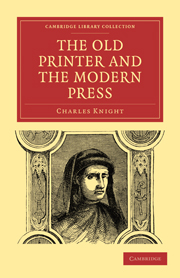Summary
Our readers can scarcely have failed to make for themselves the deduction which naturally arises out of this survey of the progress of popular literature—that there always have been, still are, and always will be, various classes of readers and purchasers; and that the invariable progress of knowledge and intelligence—from the learned to the rich, from the rich to the middle classes, from the middle classes to the multitude—has produced as invariably a corresponding change in the number of books published, their quality, and their price. As the rich began to gather knowledge, books ceased to be wholly adapted to the learned or professional student; as the burgesses began to employ their leisure in reading, books ceased to be dependent upon courtly influence; as the multitude acquired the rudiments of instruction, books became less conventional, and began to adapt themselves to all classes. But it cannot, without a judicial blindness, be assumed that we are arrived at that state in which there are no degress of intellectual advancement. It is said, to use the language of the most popular journal of our day, that the masses “do not yet feel the assurance that, if they go in thousands to the counters of the great publishing houses, as they congregate around the more plebeian shops, they will get the exact article they want, or what they consider value for their money.”
- Type
- Chapter
- Information
- The Old Printer and the Modern Press , pp. 286 - 302Publisher: Cambridge University PressPrint publication year: 2010First published in: 1854

